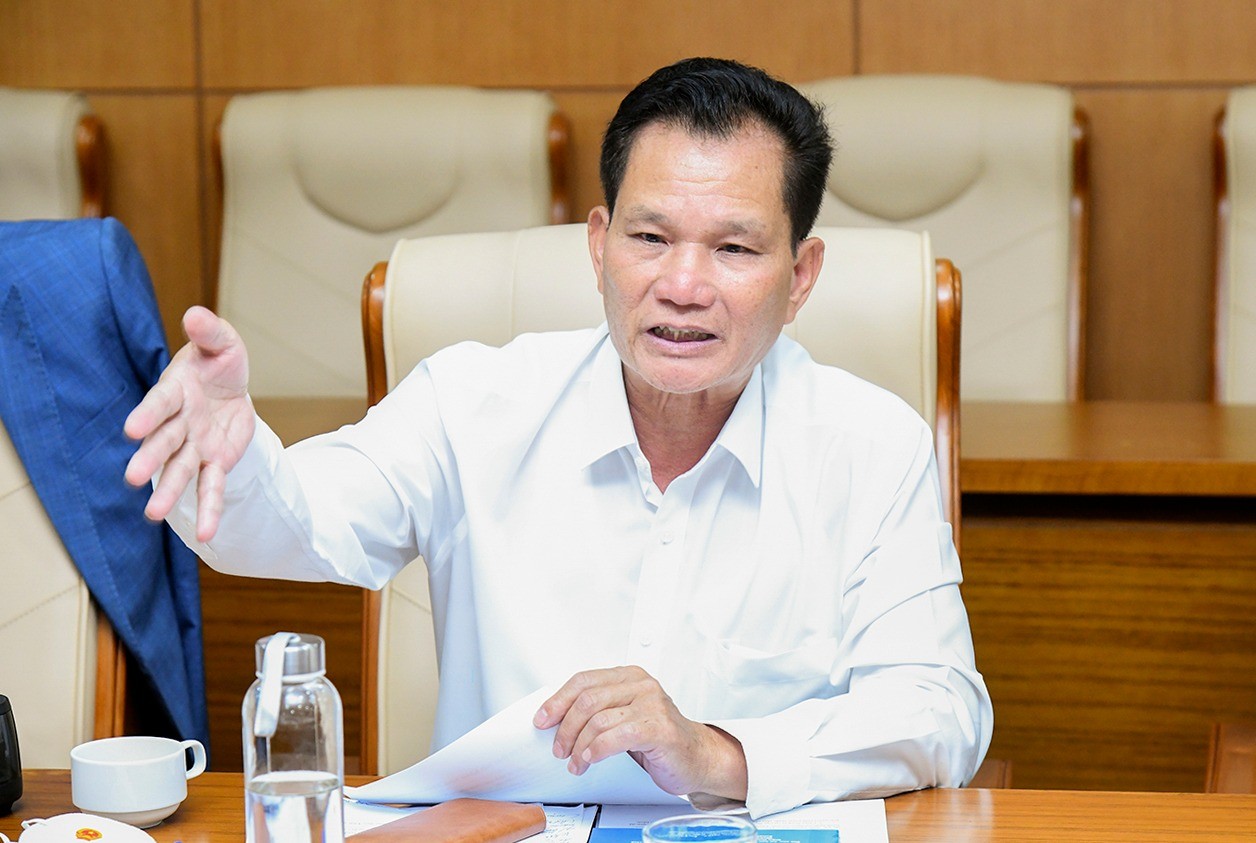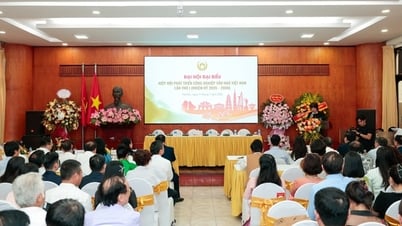From the perspective of a social security expert, Dr. Bui Sy Loi, former Deputy Chairman of the National Assembly 's Social Committee, said that salary reform on July 1, 2024 is the right and ripe time, with the goal of ensuring that workers can live on their wages.
 |
| Dr. Bui Sy Loi believes that salary reform is needed to attract and retain talented people. (Photo: NVCC) |
To let civil servants and public employees live on their salaries
Salary is always a hot issue in parliament. What is your opinion on this issue?
Salary is the most urgent issue and always heats up the parliament. Because, the current salary is no longer true to the meaning of the principle of distribution according to labor and must be based on productivity, quality and efficiency of work.
For the sector with labor relations, wages must meet the minimum living standards of workers and their families (according to the provisions of the Labor Code). For the public sector, spending on salaries for officials and civil servants is spending on development investment. Therefore, it is necessary to reform wages so that they are truly an important driving force to encourage officials and civil servants to improve their capacity to perform their duties more effectively and reduce corruption.
The nature of civil servant salaries is that, along with the development of the market economy , salaries must approach the value of market labor, and must aim for fairness and substance. It is necessary to build a minimum salary for administrative civil servants equal to labor and equivalent to the salary level in the market sector. Given the complexity and important role of administrative civil servant labor, it should be ranked at a higher level of importance than labor in the production and business sector, the career sector, and second only to the armed forces sector.
Therefore, the adjustment of minimum wages in the labor relations sector should comply with market principles through negotiations by the National Wage Council, and the wages of administrative civil servants should be reformed to ensure a living wage.
He once shared that salary reform must ensure that officials, civil servants, and public employees have enough to live on, so that they do not have to "have one leg longer outside than inside"?
Yes, the salary reform on July 1, 2024 is the right and ripe time because we have postponed the reform at least twice, since 2020. Perhaps, it is time to stop having salary and social insurance policies that are not suitable for the scale and growth rate. This is creating inequality in salaries between the State sector and the production and business sector. The important thing is that we have taken a step to reduce the payroll, reorganize the organization, and prepare resources.
Salary reform in current conditions is good news for civil servants and public employees, creating motivation for civil servants and public employees to be interested in working, promoting increased labor productivity and attachment to the agency or unit.
In the spirit of Conclusion 62, the Politburo sets out requirements for the salary reform process to consider the specific characteristics of public service units with the aim of ensuring that salaries are distributed according to work capacity, training process, contribution ability and ensuring the correct principle of distribution according to labor and salary arrangement according to job position.
Therefore, the goal of wage reform is to ensure that workers have enough to live on their wages. In particular, it is necessary to consider regulating specific allowances for specific sectors. At the same time, to retain workers working in those sectors or attract talented professionals to the public sector to overcome the situation where a number of cadres, civil servants and public employees move from the public sector to the private sector.
The Politburo's request for the Central Committee to closely follow the goals and requirements set out in Resolution 27-NQ/TW in 2018 on reforming wage policy is completely in line with the principles of wage payment and the principle of distribution according to labor.
It is important to create motivation to retain public sector civil servants, attract talented people, motivate the public sector apparatus, ensure a living wage so that officials do not have to "have one leg outside longer than the other", and wholeheartedly perform the functions and tasks assigned according to the job positions of the sectors and fields.
So, in your opinion, what challenges and barriers are we facing in salary reform?
We reformed salaries but still face many challenges. That is, the payroll is still large, the organization is not streamlined, there are still many public service units that the State has to support, but has not yet been able to move to autonomy and self-responsibility; public investment to complete the infrastructure system...
Therefore, the implementation of salary reform needs to be accelerated. For the State sector, salaries are currently very low. After nearly 5 years of implementing Resolution 27-NQ/TW of the Central Committee, we have not yet achieved the required results. On July 1, 2023, we adjusted the basic salary from VND 1,490,000 to VND 1,800,000.
I think that the salaries of cadres, civil servants and public employees are still not enough to meet the needs of life, it is very difficult to create a team of professional, dedicated and effective civil servants. Therefore, the necessary and urgent task before our eyes is to speed up the reform of salary policy to ensure the lives of cadres, civil servants and public employees, to respond to the increase in the cost of living in the market. At the same time, ensure that the salary paid is commensurate, reflecting the true value of the labor of cadres, civil servants and public employees.
 |
| Wages must reflect the true value of labor, expressed in market prices. (Source: VNA) |
Wages reflect the true value of labor
Can you suggest any specific solutions?
Wages must reflect the true value of labor, expressed in market prices. Therefore, the State needs to focus resources, considering wage reform as an investment for development. In the longer term, in 2024, we need to focus on solving 3 problems well:
Firstly, it is necessary to continue to reorganize the organization, payroll, apparatus, streamline the payroll and apparatus according to Resolution 18-NQ/TW dated October 25, 2017 on a number of issues on continuing to innovate, reorganize the apparatus of the political system to be streamlined, operate effectively and efficiently; Resolution 19-NQ/TW dated October 25, 2017 on continuing to innovate the organization and management system, improve the quality and efficiency of operations of public service units.
It must be clearly recognized that streamlining the payroll is a prerequisite for reforming wage policy. A reasonable redistribution of labor will contribute to increasing labor productivity, creating social growth for national development.
Second, it is necessary to transform public service units towards autonomy and self-responsibility, but this must be done selectively, ensuring that these units meet all operating conditions as prescribed by law.
Third, we must create resources to reform wage policy. To reform wages, we must have resources, which come from streamlining the payroll, from saving expenses, from preventing corruption and negativity, from practicing thrift and fighting waste, and from increasing local and central government revenue.
When revenue increases beyond the target, that money must be set aside to implement salary reform. At the same time, growth investment spending must be reduced to reserve a portion of resources for salary reform, because investment in salary reform is investment in development.
As you just mentioned, investing in wages is investing in development, so what are your expectations for implementing wage reform in the coming time?
People are the focus, the goal, and the driving force of development. To achieve this goal and realize this ideology, implementing salary reform and ensuring the material life of workers, cadres, civil servants, and public employees is very important.
We need to carefully look at and evaluate the situation of a team of public sector civil servants "overflowing" into the private sector. It can be affirmed that this is a brain drain from the public sector to the private sector. If not overcome, it will lead to a situation where our civil servants are unable to take the lead, orient and lead the workforce.
From that reality, I hope that the implementation of salary policy reform will ensure a living wage for officials and civil servants according to job position, title and leadership position, in accordance with State resources and public service revenue. Ensure a reasonable correlation with wages in the labor market. Thereby, contributing to building a clean, streamlined political system that operates effectively and efficiently, ensuring the lives of wage earners and their families, and achieving social progress and justice.
The issue of wages depends on many factors, especially socio-economic conditions, social labor productivity, and the growth rate of the economy; the average wage growth rate must be slower than the growth rate of labor productivity. Therefore, wage reform can only be achieved when labor productivity increases and the economy develops.
More importantly, when implementing the wage policy reform process, the total amount of money in circulation will increase, leading to an increase in the cost of living index. Therefore, if the Government does not have solutions to control inflation and stabilize market prices, wage reform or increasing income for workers will no longer be meaningful.
The process of implementing salary policy reform must be synchronized with the process of administrative procedure reform and must continue to rearrange the organizational apparatus and streamline the payroll. The most important thing is to apply information technology, digital technology, and digital economy to minimize manual labor while still increasing labor productivity. In the 4.0 industrial society, human resources are extremely valuable. We must strive to have a progressive society, the 4.0 industrial revolution must be about working less and enjoying more.
Thank you!
Source





























![[Photo] Gia Lai provincial leaders offer flowers at Uncle Ho's Monument with the ethnic groups of the Central Highlands](https://vphoto.vietnam.vn/thumb/1200x675/vietnam/resource/IMAGE/2025/7/9/196438801da24b3cb6158d0501984818)







































































Comment (0)